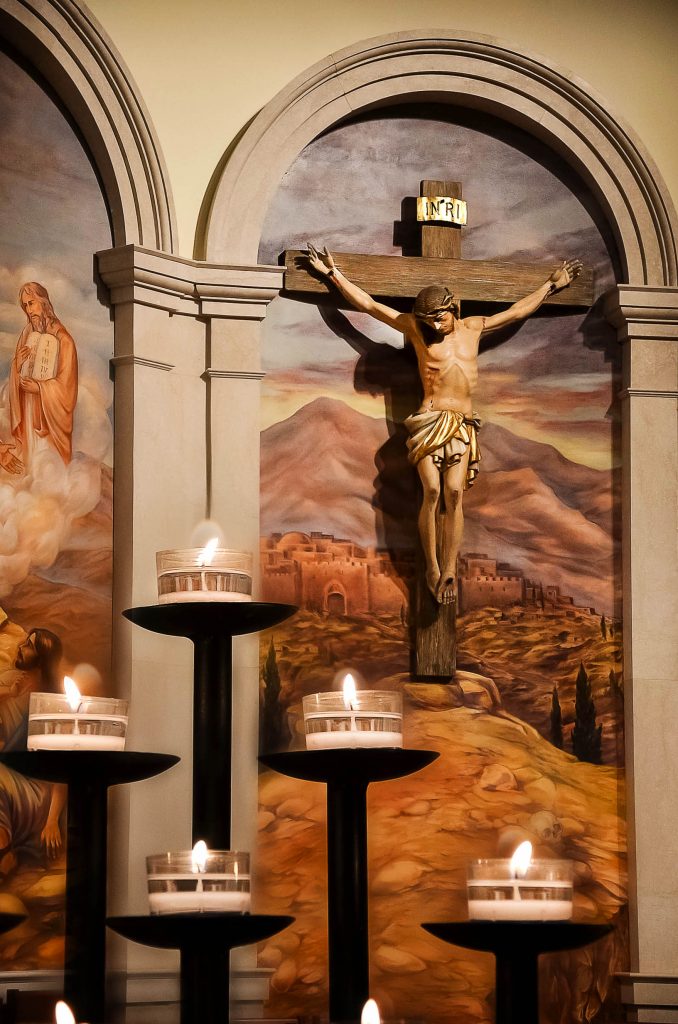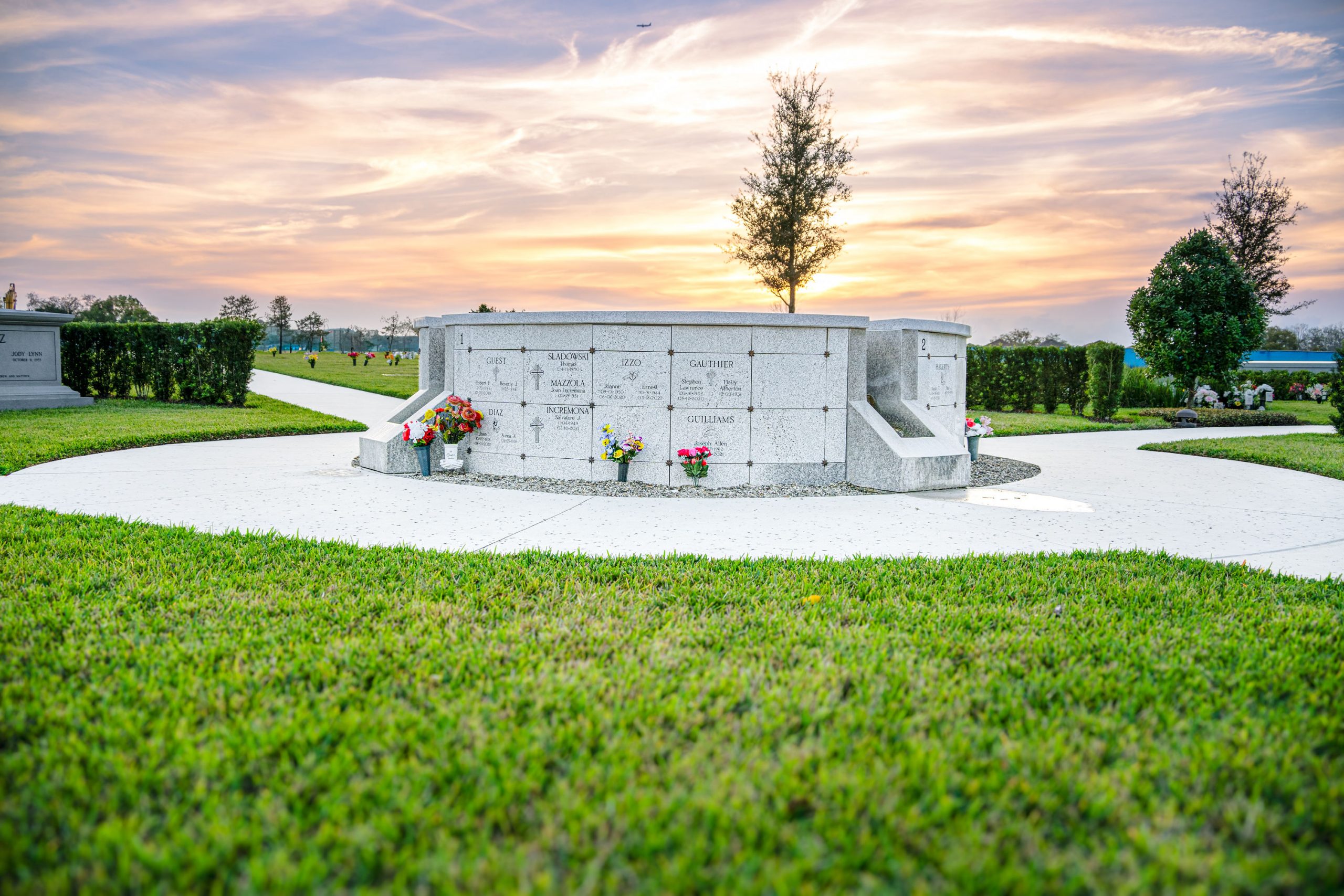Considering Cremation
Historically the Catholic Church did not support cremation. In May 1963, the Vatican lifted the prohibition forbidding Catholics from choosing cremation. While you do not need permission, it is a good idea to discuss cremation with your pastor or parish bereavement minister as there are certain guidelines families must follow.
The Congregation for the Doctrine of the Faith published the instruction Ad resurgendum cum Christo on October 25, 2016 regarding the burial of the deceased and the conservation of the ashes in the case of cremation. The full text is available in both English and Spanish.
What is Cremation?

During the cremation process, the body is placed in a rigid container or casket, then put into the cremation chamber. With heat and evaporation, the body is reduced to a fine powder, referred to as cremated remains. The cremated remains are typically placed in a temporary container provided by the funeral home or crematorium. The cremated remains are to be kept intact and should be handled, transported and treated with the same respect as if it was the full body of the deceased. Cremated remains should be placed in a worthy, durable container (referred to as an urn) and must not be distributed among family members, processed into jewelry, scattered on the ground, thrown into the wind, or cast upon water.
When Do We Cremate?
The Church prefers when cremation is chosen, the full body be present during the Vigil and Funeral Mass Rites and cremated prior to the Committal Rite. If this is not possible, pastoral sensitivity permits cremated remains to be present for the performance of all Catholic Funeral Rites.
Do We Still Celebrate All of the Funeral Rites?
Yes, all Catholic Funeral Rites may be celebrated with full effect in the presence of cremated remains. Catholic Funeral Rites
What Do We Do with the Cremated Remains?
The final placement of the urn containing the cremated remains is in a cemetery. The urn may be buried in the ground or inurned in a columbarium (a vertical structure for placement above the ground).
It is permitted for an urn to be buried at sea if it is weighted down and will remain below the surface of the water.
Keeping an urn in the residence of family or friends is not the respect and honor the Church wants to preserve for her departed children. Not burying or inurning the cremated remains of a loved one in a cemetery deprives other family members, friends and future generations from visiting and praying in the presence of the loved one. Memorialization by grave markers or inscriptions on the columbarium will provide a permanent record of the loved one’s life.
It is never too late for the cremated remains of your loved one to be buried or inurned. Additionally, Catholic Funeral Rites may still be available if the cremated remains of your loved one have been scattered or separated.

Why choose a permanent burial site for cremated remains?
Wherever the cremated remains go initially, the decision NOT to commit them to a permanent burial location can have many unintended and far-reaching effects over the years and generations to come. Before you make an irreversible decision, please consider the impact this decision may have on your life and the lives of others – some of whom have not yet been born.
| Consequences of No Burial | Benefits of Permanent Burial |
| At the time of death, one family member takes possession of the cremated remains, to the exclusion of all others. | All friends and family members have a special place to visit and remember. |
| The cremated remains are scattered, buried in the back yard, separated into jewelry, left in a closet or on a shelf. Eventually, many friends and family members do not even know where the cremated remains are. | Friends and family can visit, pray, bring flowers or make dedications in honor of a birthday, anniversary or any special occasion. |
| As the family changes through birth, death and divorce, control of the cremated remains may change over the years. | All friends and family members can visit a neutral location without anyone else’s knowledge or permission. |
| Property ownership may also change. If the land where the cremated remains are buried or scattered is sold, then visitation may no longer be possible. | Cemeteries will always be there, open to visitations by one and all. |
| As the next generation grows up, they will one day ask about those who came before them. At some point, no one will remember where their cremated remains are or when they lived. | Grave markers will always provide a permanent record of your loved one’s life, with their name and brief history for all to see. |
The wisdom of our Church, as Mother, calls for cremated remains to be treated with the dignity and respect which the body of our dear departed deserves for they are “also the body once washed in baptism, anointed with the oil of salvation and fed with the Bread of Life.” (Order of Christian Funerals 411)
Doesn’t your loved one deserve the dignity and respect of a permanent burial site?
The cemetery you select will be a central place for you and the family and friends of your loved one to gather in prayer and remembrance.
Whether the cremation took place last week or ten years ago, now is the time and opportunity to arrange for the Catholic burial of your loved one. Contact a Catholic Parish Community who will honor the opportunity and privilege to pray with you as you lay your loved one to rest.
Is the Body Embalmed Before Cremation?
Embalming is not required if cremation occurs soon after death. However, it is best to discuss this matter with your funeral services director. If the full body will be present for the Vigil and Funeral Mass, refrigeration may be an alternative to embalming.
Do We Need a Casket?
A durable casket is not necessary with cremation. However, a container is required to transport the body and for use in the cremation process. When the full body is present during the Vigil and Funeral Mass and cremation follows, you may consider renting an inexpensive casket.
If you have specific questions about cremation, Catholic Cemeteries of Central Florida has the answers. Please call us at (407) 246-4919 for additional guidance.


